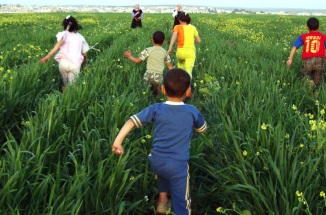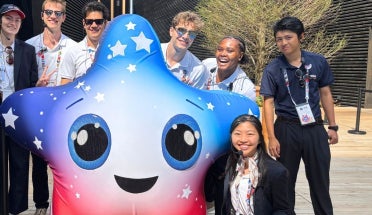
Peace Corps Volunteer in Zambia Reflects on Texas' Global Reach
- Feb 28, 2024
- Peace Corps
- by Trinity Bella Hawkins
Making a positive impact on the world has been one Angelina Liu's lifelong ambitions.
Having grown up in the Houston neighborhood of Sugar Land, Liu attended The University of Texas at Austin with a major in human development and family studies. After graduation in 2022, she took a leap toward her goal when she joined the Peace Corps and found herself assigned to service in Zambia.
“I thought, originally, that I would want to go down the path of medicine,” said Liu. “I'd always been pre-med throughout college, and I'm still pre-med now.”
But enduring COVID during college was difficult for Liu and her classmates. “After I graduated in 2022, I was like, let me take a gap year,” she said, referencing how drastically the pandemic transformed perspectives and plans for students at UT Austin and around the world.
“I'd always wanted to do the Peace Corps,” said Liu. “It was something I considered doing around the time that I was graduating and sort of thinking into it. But because [I] would serve for two years at a time, without any professional work experience, I worried that two years might feel a little long.”
UT’s Investment in Peace Corps
For students interested in volunteering after graduation, UT Austin offers Peace Corps programs and resources via Texas Global. The University frequently ranks as a leading institution in producing Peace Corps Volunteers, most recently placing ninth nationwide in 2023 with 1,922 volunteers.
To offer information and advising for interested students, UT also employs a Peace Corps recruiter on campus, Anne Saldivar. She described the benefits she sees arising from Peace Corps service, for international partners and Volunteers, alike.
“To truly foster innovation and create positive change, Peace Corps Volunteers put themselves out there and become comfortable with being uncomfortable,” said Saldivar. “This creates not just lasting networks, but also the necessary skills for grassroots diplomacy based on mutual respect around a shared experience.”
Additionally, the Forty Acres provides a Peace Corps Prep certification program for students hoping to develop their service skills and bolster the likelihood of their acceptance into Peace Corps after graduating. A PC Prep certificate highlights how a student’s time at UT aligns with Peace Corps values, further demonstrating that they went the extra mile to enact and document thoughtful steps toward service.
PC Prep Faculty Advisor Michele Hockett Cooper echoes Saldivar’s sentiments about the impact of global service on its Volunteers. “Peace Corps Volunteers naturally develop an entire skill set during their service: the ability to work with limited resources, resiliency (especially in the face of unforeseen challenges), and an openness toward collaborative relationships with vastly different stakeholders.”
Building a Path from the Forty Acres
Liu’s previous experience working with campus service and philanthropy groups piqued her interest in Peace Corps topics. “While I was on campus, I was involved in the Texas Asian Panhellenic Council. I was a member of Kappa Phi Lambda, one of the Asian interest sororities, and I did a lot of philanthropy/volunteer work with them throughout undergrad. So that definitely spearheaded my passion in rural health.”
Liu's decision to apply to the Peace Corps was also influenced by the advice of her UT Austin professors, who helped her navigate this new professional path after graduation, watering the seeds she had planted while on the Forty Acres.
“I was part of the research project, Project Seed, on campus, under Professor Su Yeong Kim. She deals with rural health adjustment and development factors of families and adolescents, especially in the Latinx communities within the Austin area. This was something I was interested in, and it felt really natural.”
Still other examples and campus resources helped steer Liu onto her service-learning path. “UT also has so many study abroad opportunities,” she said. “I have friends who had internships that were international, so it felt very achievable that I could do something internationally. And because UT has a Peace Corps recruiter, that was someone that I really leaned on during my application.”
Serving to Learn, Learning to Serve
Liu expressed her intention to seek a new and transformative experience by joining the Peace Corps, an organization she believes has made a profound and ongoing impact on her life. She is currently working in Zambia with the Ministry of Health.
“The Zambia Ministry of Health’s focus is on maternal and child overall health, prenatal care, and making sure that mothers and children under five are getting the nutrients and health care they need to thrive," said Liu. "There's also a large focus on HIV/AIDS: prevention of new cases, and then continuing care and treatment for people who are already diagnosed with HIV/AIDS.”
With those weighty assignments in mind, Liu began her service with a rural health clinic in the village of Mponda in the Eastern Province of Zambia. Working at a community level, she devises projects and campaigns that promote hygiene and health.
“Sometimes here, it is a little difficult maintaining what comes to us as second nature, such as going to the restroom then washing your hands in a sink. But there are no sinks and running water in the rural villages,” she explained.
“With that example, I wanted to start a mini-project within my village — and then the surrounding villages near me — to build hand-washing stations, made out of easily attainable materials within the village.”
The overarching goal of Liu’s assignment is to construct small infrastructure projects and bolster health resources in Mponda and surrounding villages during the span of her time there.
“My goal within the next two months is to build capacity for the village I live in and those near me,” Liu reiterated. “It's a tangible thing you can create that will enhance the lives of people. Just seeing all of the kids try out the handwashing station; afterward, they're all smiling and laughing.”
As a final thought, Liu considered the lessons she was learning from the experience and the next steps she would take.
“I think, going back home, I'm going to live so much more joyfully. Even though some moments are challenging — just because it's so different from life back in the U.S., and I miss my friends and family — I live so joyfully here. And the people live so joyfully, even though they might have less than I have back home.
“I think I’ll remember there's so much to be grateful for, so much to be joyful for,” Liu ruminated. “You’ve just got to find it. And you’ve just got to feel it.”



